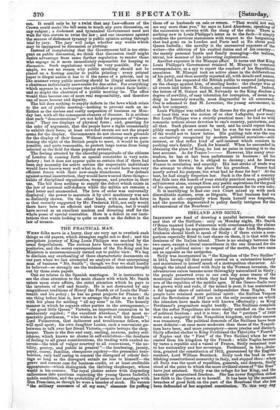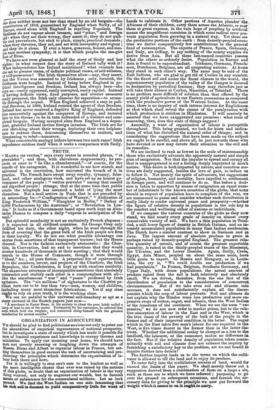IRELAND AND SICILY,
IRISHMEN are fond of drawing a parallel between their ease and that of the Sicilians : only on Monday night, Mr. Smith O'Brien taunted Lord Palmerston with countenancing the claims of Sicily, though he negatives the claims of the Irish Repealers. Irishmen should blush to speak of Sicily : if there exists a com- parison especially fitted to cast shame on them, it is that with the denizens of the Italian island. There is no analogy between the two cases, except a literal resemblance in the one demand for the repeal of a political union : in respect of the merits, the two cases are as opposite as the antipodes. Sicily was incorporated in " the Kingdom of the Two Sicilies" in 1815, having till that period carried on a substantive history and maintained to herself much of a metropolitan character. Al- though the island shared with Italy in the Norman invasion, the adventurous rulers became more thoroughly naturalized in Sicily; the people preserved even to our own day some traces of the municipal institutions which they had brought down from the sera of the republics of the middle ages. If the Grano-Italic race has grown wild and rude, if the island is poor,"it has maintained a far larger share of national independence than Naples. Its people have retained more political spirit : the Sicilian Vespers and the Revolution of 1847 are not the only occasions on which the islanders have made their will known effectually ; as King Ferdinand's progenitors might testify. The Sicilians complain that the softer Neapolitans are more easily satisfied on the score of political freedom : and it is true ; for the " patriots " of 1820 were not a majority of the Neapolitan kingdom, and their success was transitory. The political demands of the Sicilians have been more definite—at once more moderate than those of the Neapoli- tans have been, and more peremptory—more precise and distinct. Sicily afforded shelter to King Ferdinand the Third (the " Fourth" of Naples and the " First" of the Two Sicilies) when he was ousted from his kingdom by the French : while Naples became by turns a republic and a vassal of France, Sicily remained true to her nationality and her sovereign. Ferdinand, in his Libula- tion, granted the constitution of 1812, guaranteed by the English resident, Lord William Bentinck. Sicily took the lead in esta- blishing constitutional monarchy in Italy, and stopped there: when all Italy was the sport of republics, generals, and despots, Sicily stood at the point to which the more civilized states of "the Boot" have just attained. Sicily was the refuge for her King, and the example of guaranteed freedom. She has never forgotten either her faith to the Crown or to herself. It has been by the meanest breaches of good faith on the part of the Bourbons that she has been defrauded of her acquired constitution. To this very day she does neither more nor less than stand by an old bargain—the constitution of 1812, guaranteed by England when Sicily, of all Europe, stood alone with England in repelling Napoleon. The Sicilians do not vapour about treason, and "pikes," and foreign when they see their wrong, they assert it ; they do not quib- ble and prevaricate, but stick to plain, simple, practical demands ; when they threaten, they act, and act with intrepidity and vigour ; and they do it alone. If ever a brave, generous, honest, and sim- ple race merited sympathy, it is that which peoples the sea-girt foot of Etna. We have not even glanced at half the story of Sicily and her rights: in what respect does the story of Ireland tally with it ? at independence has Ireland maintained ? what example has she set to greater states, of definite political views, of self-reliance, or self-possession ? The Irish themselves allow—nay, they assert, that the Union was assented to by Irishmen ; only, forsooth, the Irishmen were bought. Instead of being before England in po- litical intelligence and freedom, Ireland has always been—she says so—easily oppressed, easily corrupted, easily cajoled. Instead of having definite views, fixed purposes, and ulterior measures ready prepared, the Irish only clamour for separation—to scram- ble through the, sequel. When England achieved a step in poli- tical freedom, in 1688, Ireland resisted the agent of that freedom. Ireland has never received a fugitive King of England, defended him successfully against the conqueror of Europe, and restored him to his throne ; to be in turn defrauded of a distinct and com- pleted bargain. Having accepted alms from England as a depen- dent, grateful Ireland invites foreign invasion. The Irish are for ever shrieking about their wrongs, deploring their own helpless- ness to redress them, denouncing themselves as traitors, and threatening to rebel—tomorrow.
What conceivable analogy isthere between two such cases? Irish impudence outdoes itself when it seeks a comparison with Sicily.



























 Previous page
Previous page